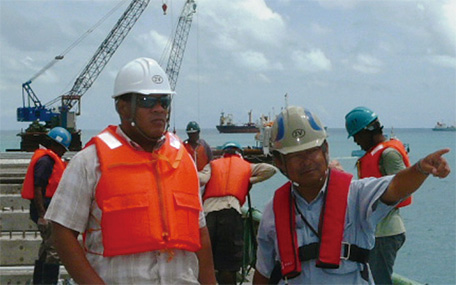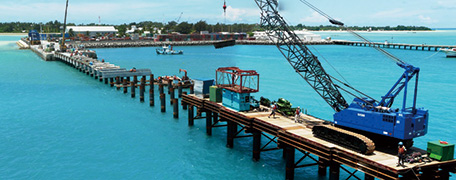Japan's Official Development Assistance White Paper 2012
Stories from the field 14
Improving Lifeline of Kiribati, a Remote Island Country in the Pacific
– Enabling Large Ships to Berth at Betio Port –

Mr. Anan with an officer from the Kiribati Ministry of Communication, Transport and Tourism Development (MCTTD) (Photo: Masanori Anan)
The Republic of Kiribati is a nation made up of islands scattered across an area around the equator in the South Pacific Ocean, spanning as vast as 4,000 km from east to west and 2,000 km from north to south. The total land area of more than 30 islands is only 720 km2, or about the size of Tsushima in Nagasaki Prefecture. The soil on the islands encircled with coral reefs is not suitable for agriculture, so the country depends on imports for most of its vegetables and other daily necessities from New Zealand and Australia. Supplies from overseas are received at Betio Port on Tarawa Atoll, which is the country's capital. Betio Port is also Kiribati's only international port and is certainly the lifeline of the island nation.
Japan has been involved in the development of Betio Port for many years. From 1997 to 2000, the Japanese government improved a pier and container yard to enable cargo vessels to berth and the port to handle containers. Later Japan also repaired shore protection damaged by unusual ocean waves, considered to be caused by El Niño weather patterns. The size of cargo vessels has become larger in recent years, and some of them cannot berth at Betio Port because the water in front of the pier is not deep enough. In such cases, it is necessary to moor vessels in deep enough water, load their containers onto barges and unload at the pier. The cost of such transfer increases prices of goods.
The Project for Expansion of Betio Port (Main Construction), four years of grant assistance that started in 2011, will enable large cargo vessels to berth and unload directly at the port. Site Director Masanori Anan belongs to the joint-venture group consisting of Dai Nippon Construction and Toa Corporation and was involved in the initial assistance of Improvement of Betio Port Project that started in 1997. Mr. Anan, who has been working on-site on foreign aid projects for 15 years since he started his career at Dai Nippon Construction, said, "There is only a limited number of products, such as fish and coconuts that Kiribati is able to produce self-sufficiently. Fuel, foodstuffs and other items sold at stores are mostly imported. If stores run out of merchandise, all they can do is wait for the next scheduled ship."

Full view of a bridge under construction with the container yard in the background (Photo: Masanori Anan)
Kiribati also has to procure all of its materials from overseas. The Japanese government chartered a cargo vessel to carry 10,000 tons of materials from Japan for this project. Mr. Anan was surprised at the excellent work done by the Kiribati workers charged with unloading: "The workers were more skilled than we anticipated. In fact we were worried that some of the supplies would suffer damage during unloading. Once they finished, though, we found that the supplies were in perfect condition." The construction works done in Kiribati through ODA to date have improved the quality of Kiribati workers.
The current project has entered its second year. Steel-pipe piles manufactured in Japan are being driven into the ocean floor. The latest construction method is adopted to ensure dependable quality and the work is moving forward quite smoothly because the crew is familiar with it. Mr. Anan feels that locals have begun to see the need for this project. The government of Kiribati has taken the initiative to handle paperwork and provide other assistance to promote the project. A majority of the citizens of the small country understand that the port is being improved through Japanese assistance, and they have expressed their gratitude. Dai Nippon Primary School was so named to pay respect to Dai Nippon Construction, the company involved in implementing Japanese assistance to build roads to connect islands to one another. Mr. Anan reflected on the thanks he has received from people:
"I hope that they maintain what we have built after we are finished. I believe that growth depends heavily on people taking care of things they have." Betio Port is Kiribati's lifeline, and Mr. Anan offered his heartfelt hopes that people will take good care of the port so that Kiribati will further develop.
